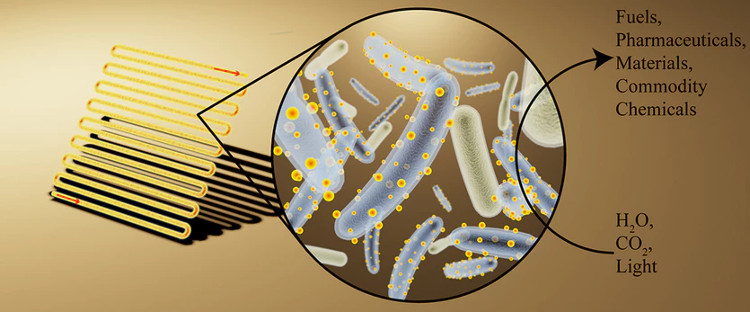This bacterium will be the world's new energy source
Semi-mechanical bacteria can be a perfect substitute for fossil fuels that are increasingly depleted .
Natural photosynthesis is based on chlorophyll. Plants and other organisms use green pigments to capture sunlight during photosynthesis, but this method is not very effective.
In an effort to improve the efficiency of natural photosynthesis, Kelsey K. Sakimoto, a researcher at the Peidong Yang Laboratory, University of California, Berkeley, created cyborg bacteria (cyborg: Biomass gasification, mechanical organisms, biochemical organisms, cybernetic organisms or semi-mechanical biology: is the term for organisms that exist both biologically and artificially.
Cyborg bacteria trained to cover solar panels are more effective than chlorophyll (Chlorophyll is an extremely important component of the leaves, thanks to chlorophyll whose leaves have their distinctive green color) in converting sunlight into useful compounds.
Sakimoto said: "Instead of relying on less effective chlorophyll to capture sunlight, I taught bacteria how to grow and cover their bodies with small nano-semiconductor crystals."

New hybrid bacteria produce useful substances from light, water and CO2 with higher speeds than any natural photosynthetic source.(Photo by Kelsey K. Sakimoto).
To produce cyborg bacteria, Sakimoto fed them with cysteine amino acids and elemental cadmium . The bacterium then synthesizes the calcium sulfide nanoparticles (CdS), effectively absorbing light, acting as solar panels on the surface of bacteria.
New hybrid organisms, called M. thermoacetica-CdS , produce useful acetic acid from light energy, water and CO2 at a higher rate than any natural photosynthetic source.
Humanity is facing the need to replace fossil fuels as a result of rapid greenhouse gas emissions and population growth. Artificial photosynthesis is not a new concept, but a system that requires only sunlight and simple organic chemicals to create renewable and low-cost renewable energy is what researchers towards.
Although there has been some progress in this area, so far, there has been no effective solution to ensure a wide range of applications in trade.
However, Sakiomoto's bacteria are 80% more efficient and able to replicate, regenerate, and reduce waste. He explained: "When covered with these small solar panels, bacteria can synthesize food, fuel and plastics, all of which only use solar energy."
Sakiomoto hopes cyborg proven trials are a viable alternative to fossil fuels and help the world produce cheaper and cleaner energy.
Sakimoto presented his research at the National Conference and Exhibition of the 254th American Chemical Society (ACS).
- Found a rare form of chlorophyll in a new bacterium that is sequenced
- Mysterious energy source 'missing' on Earth
- The precious energy source waits 'wake up'
- Slow flowing water will be a renewable energy source
- Energy Observer - 'Laboratory' of floating energy throughout the world
- Most of the world's solar cells are installed in the wrong direction
- Future energy source from infrared rays
- Mysterious energy source from thermal energy battery
- Burning ice - a new energy revolution?
- Wind + Water = potential energy source
- We have endless energy, but why haven't we used it yet?
- Vietnam 'neglects' renewable energy sources
 Why do potatoes have eyes?
Why do potatoes have eyes? 'Tragedy' the world's largest carnivorous life: Death becomes ... public toilet
'Tragedy' the world's largest carnivorous life: Death becomes ... public toilet Tomatoes were once considered 'poisonous' for 200 years
Tomatoes were once considered 'poisonous' for 200 years Detecting microscopic parasites on human face
Detecting microscopic parasites on human face